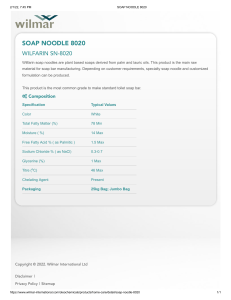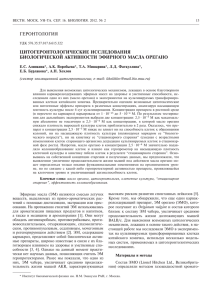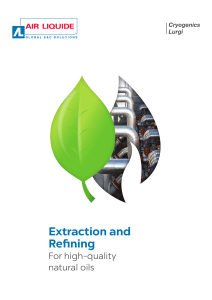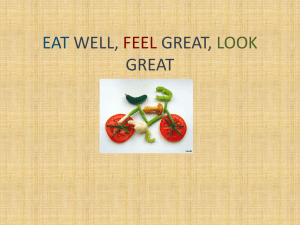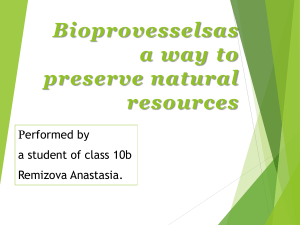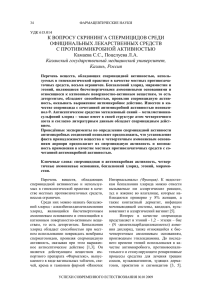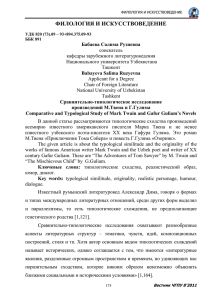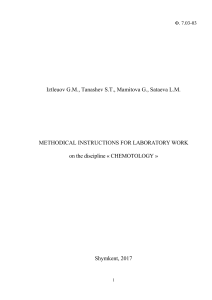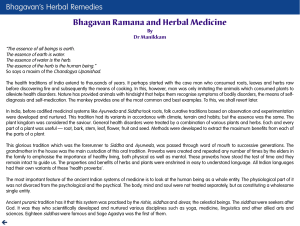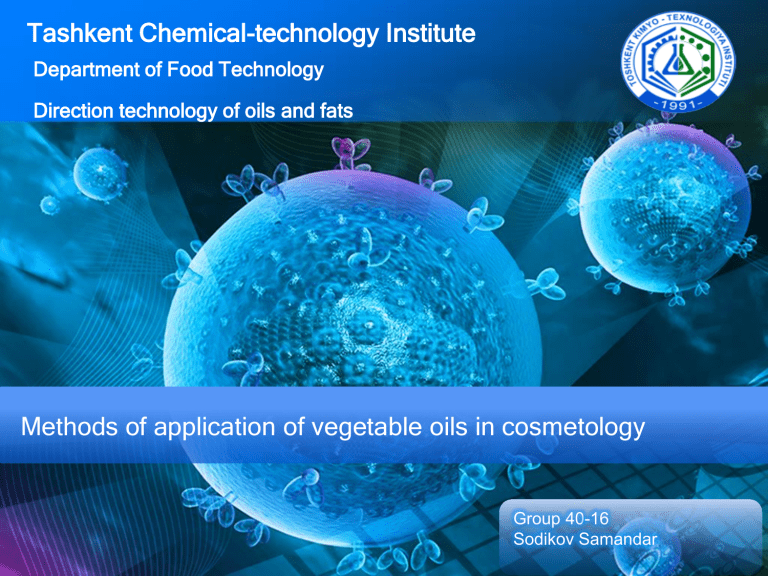
Tashkent Chemical-technology Institute Department of Food Technology Direction technology of oils and fats Methods of application of vegetable oils in cosmetology Group 40-16 Sodikov Samandar My specialty – introduction I’m 3ed year student in Tashkent chemicaltechnological institute. My faculty is Food production technology and my direction is oils and fats technology. My future profession is chemist-technologist of oils and fats. Chemist-technologist monitors compliance with the technology of production, identifies and eliminates the causes of problems, controls the quality of products, develops new recipes. My specialty – introduction Many people often ask me: “What is the difference between oils and fats?”. It’s not difficult. Many oils are of vegetable origin and they are mostly liquid. Many fats are of animal origin and they are mostly solid. But, there are a few exceptions. For example fish oil, fish oil is of animal origin, but it is liquid. Another exception is palm oil, which is of vegetable origin but, it is solid. The theme of my presentation is “Methods of application of vegetable oils in cosmetology”. Quality With the development of technology and industry, it becomes obvious that mindless consumption of mass food and self-care ceases to be safe. Manufacturers in the pursuit of cheaper products may include far from useful ingredients, which, however, allow them to store products longer, unfortunately, often due to deterioration in quality. Diversification in cosmetic products To date, the list of cosmetic products is very extensive. Soap base is also a product of cosmetic chemistry. The soap base is an almost finished, odorless soap, color and additives. Soap base is used to make soap with your own hands, thanks to the addition of natural ingredients, dyes, essential oils and other components. Examples of handmade soap from soap base Examples of handmade soap from soap base Examples of handmade soap from soap base Application of vegetable oils The recipe of natural soap base developed by me includes coconut and castor oil, which has unique functional purposes. Thanks to a balanced formulation of the base, the negative influence of natural substances is reduced, as well as it gives it additional caring properties. The soap base obtained by laboratory experiments has a neutral smell, a translucent yellowish color, melts well and is cut, plastic, well-colored, well conveys the properties of enriching oils, extracts, does not distort the aromas, provides good foaming. The value of superfat in the soap The oils that make up the creams can have a direct effect on the skin, promote the penetration of biologically active substances into the deeper layers of our skin. Vegetable oils help the skin to compensate for the deficiency of lost epidermal lipids, especially ceramides, restore its barrier functions, and activate lipid metabolism. Superfat are those oils that do not undergo reaction with an alkaline solution, i.e. not saponificated. And since they do not decompose into salts of fatty acids and glycerin, they direct all their beneficial properties to care for our skin. The benefits of handmade soap Handmade soap almost always contains additional caring ingredients, for example, vegetable and essential oils, plant extracts. These substances, in turn, have a therapeutic effect on the skin. Laboratory experiments Laboratory experiments Conclusion In conclusion of my presentation I wanted to emphasize the fact that one of the important achievements in my profession as an oil and fat technologist is his broad profile. The ability to integrate practical knowledge not only in food but also in other industries such as aviation, cosmetic, in the production of medicines, electrical engineering, etc. There are a lot of unexplored materials in this industry. Because of this industry has a promising future!
